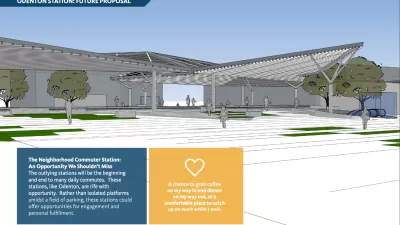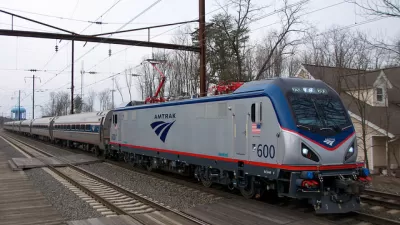What the U.S. does with twenty-five workers, Spain does with nine; 'work rules' are part of the problem when it comes to the lack of productivity and high costs of America's regional rail systems.
Stephen Smith continues his examination of the inefficiencies plaguing America's rail transit systems. While his prior piece focused on the comparatively high cost of construction, this piece looks at the how "high labor costs drag down service, prevent new lines from opening, and depress ridership and revenues," along the nation's commuter railroads.
According to the article, many American commuter railroads over-employ unneeded conductors, often at the fault of powerful union work rules. Vukan Vuchic, a professor of transportation engineering at the University of Pennsylvania, suggests that, "regional railroads should adopt leaner train crews, allowing them to run more trains an hour. In other words, get rid of conductors. Turnstiles would replace them on busy lines, with proof-of-payment systems for those with less traffic. This honor system enforced by occasional ticket checks with heavy fines for fare dodgers was popularized in Europe, and has already spread to buses and newer North American rail systems."
Despite the pleas of many, and a stated 'win-win' for both passengers and labor by the author, progress to adopt more efficient labor practices and upgrade infrastructure to automate more of the passenger experience has remained slow.
FULL STORY: Labor Rules Snarl U.S. Commuter Trains

Planetizen Federal Action Tracker
A weekly monitor of how Trump’s orders and actions are impacting planners and planning in America.

San Francisco's School District Spent $105M To Build Affordable Housing for Teachers — And That's Just the Beginning
SFUSD joins a growing list of school districts using their land holdings to address housing affordability challenges faced by their own employees.

Can We Please Give Communities the Design They Deserve?
Often an afterthought, graphic design impacts everything from how we navigate a city to how we feel about it. One designer argues: the people deserve better.

The EV “Charging Divide” Plaguing Rural America
With “the deck stacked” against rural areas, will the great electric American road trip ever be a reality?

Judge Halts Brooklyn Bike Lane Removal
Lawyers must prove the city was not acting “arbitrarily, capriciously, and illegally” in ordering the hasty removal.

Engineers Gave America's Roads an Almost Failing Grade — Why Aren't We Fixing Them?
With over a trillion dollars spent on roads that are still falling apart, advocates propose a new “fix it first” framework.
Urban Design for Planners 1: Software Tools
This six-course series explores essential urban design concepts using open source software and equips planners with the tools they need to participate fully in the urban design process.
Planning for Universal Design
Learn the tools for implementing Universal Design in planning regulations.
Borough of Carlisle
Smith Gee Studio
City of Camden Redevelopment Agency
City of Astoria
Transportation Research & Education Center (TREC) at Portland State University
City of Camden Redevelopment Agency
Municipality of Princeton (NJ)





























